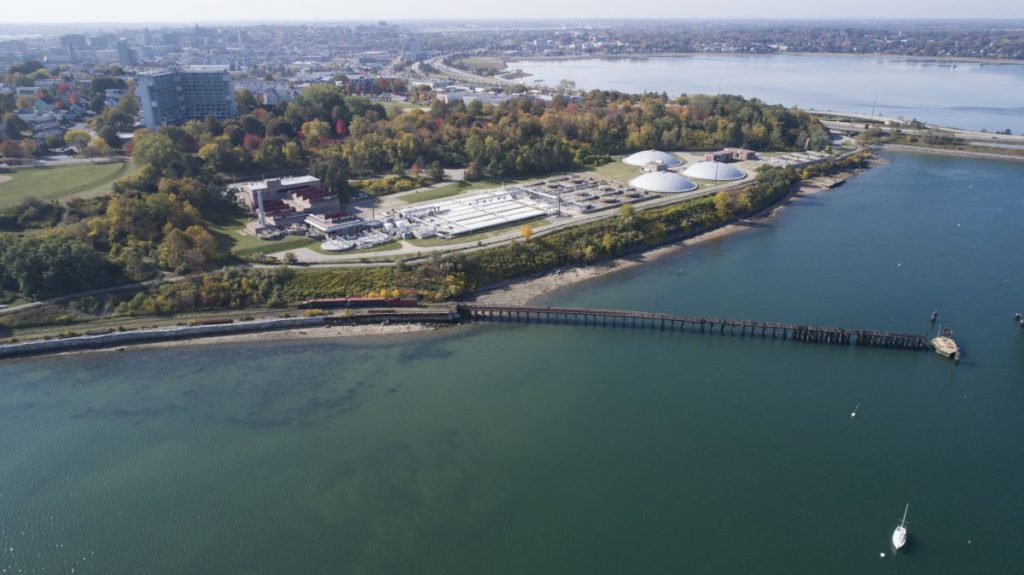Industrial Pretreatment Portland
Industries in this program are connected to the city of Portland’s sewer collection system and the wastewater they generate is treated at PWD’s East End Wastewater Treatment Facility. The Portland industrial pretreatment program is funded by a high-strength BOD and TSS surcharge, which is administered by the city of Portland.
Permits
The Portland Water District issues permits to industrial users of the wastewater system in Portland. As of January 2025, 27 industrial users were permitted in the program. Industries are permitted when they meet one or more of the following conditions:
- Discharge an average of 25,000 gallons or more of process wastewater per day
- Discharge a process waste stream making up 5% or more of the average dry weather flow (or load) to the treatment plant
- Subject to Federal Categorical Standards
- Have reasonable potential to impact or affect the treatment plant or collection system or reasonable potential to violate a pretreatment standard
Industrial Users are issued one of two different types of permits based on the types of activities they are performing. Permit types include:
Full Permit
- Renewed every three years
- Conduct self-monitoring on a regular basis
- Submit discharge reports on a routine basis (monthly, quarterly, or semi-annually, depending on wastewater characteristics)
Best Management Practice (BMP) Permit
- Renewed every three years
- Not required to conduct self-monitoring
- Submit BMP certifications semi-annually
- Each permittee in the Portland IPT program pays a $300 permit application fee when applying for a new or renewed permit.

Permitted industries (as of January 2025):
- Allagash Brewing
- Barber Foods St John Street
- Bristol Seafood
- Concord Coachlines BMP
- Covetrus Maine BMP
- Cozy Harbor Fish Pier
- Cozy Harbor St John Street
- Ecomaine Landfill
- Ecomaine Waste-to-Energy BMP
- Geary Brewing BMP
- HP Hood
- ISF Trading
- Inland Technologies
- Kerry
- Kimberly Clark Larson-Chapman Landfill
- Maine College of Art BMP
- Mercy Hospital Fore River Campus BMP
- Maine Medical Center Bramhall Campus BMP
- Maine Medical Center Brighton Campus BMP
- Nichols-Portland
- NNEPRA-AMTRAK BMP
- Nova Seafood
- NRC BMP
- Oakhurst
- Savory Bastard LLC BMP
- Sprague Operating Resources BMP
- Unifirst
| Portland Limits | |
| Parameter | Discharge Limit, Daily Maximum |
| Biochemical Oxygen Demand (BOD) | * |
| Total Suspended Solids (TSS) | * |
| Arsenic** | 0.22 mg/L Seafood Processors/ 0.092 mg/L All Others |
| Cadmium | 0.024 mg/L |
| Chromium | 1.90 mg/L |
| Copper | 1.88 mg/L |
| Cyanide | 0.13 mg/L |
| Lead | 0.60 mg/L |
| Mercury | 0.014 mg/L |
| Nickel*** | 0.76 mg/L |
| Silver | 0.42 mg/L |
| Zinc | 2.57 mg/L |
| Total Oil and Grease | 500 mg/L |
| Non-Polar Oil and Grease (Hydrocarbon) | 100 mg/L |
More information
Portland Sewer Ordinance and Sewer User Rules
PWD Sewer User Rules
Enforcement Response Plan effective 2-15-21
Federal categorical regulations
Dental amalgam rule
pH must be greater than 5.0 standard units and have a caustic alkalinity less than 1000 mg/L. Any pH result above 10.3 standard units must be accompanied by a result for caustic (hydroxide) alkalinity from the same sample. pH above 12.5 standard units is prohibited and considered hazardous waste.
*Industrial Users permitted in the Industrial Pretreatment Program and discharging effluent which exceeds a de minimis level of BOD and/or TSS are individually allocated a pounds per day limit for these parameters. The de minimis levels are as follows: Portland: 250 mg/L and/or 2275 lbs/day for BOD and 300 mg/L and or 1925 lbs/day for TSS.
The Control Authority (PWD) reserves the right to permit users based on their potential to discharge high strength BOD and/or TSS waste. Industrial Users who are permitted for BOD and TSS must report a certified discharge flow number with each monitoring event.
**Two-tiered Arsenic limit as follows: Seafood Processors must achieve discharge limit of 0.22 mg/L, all others must meet limit of 0.092 mg/L.
***Metal Finisher required to meet Categorical Maximum 30 Day Average Nickel Discharge Limit of 2.38 mg/L.
NOTE: the city of Portland may have adopted other prohibitions and limitations in their respective rules or ordinances. Please refer to the city’s ordinances for more information.